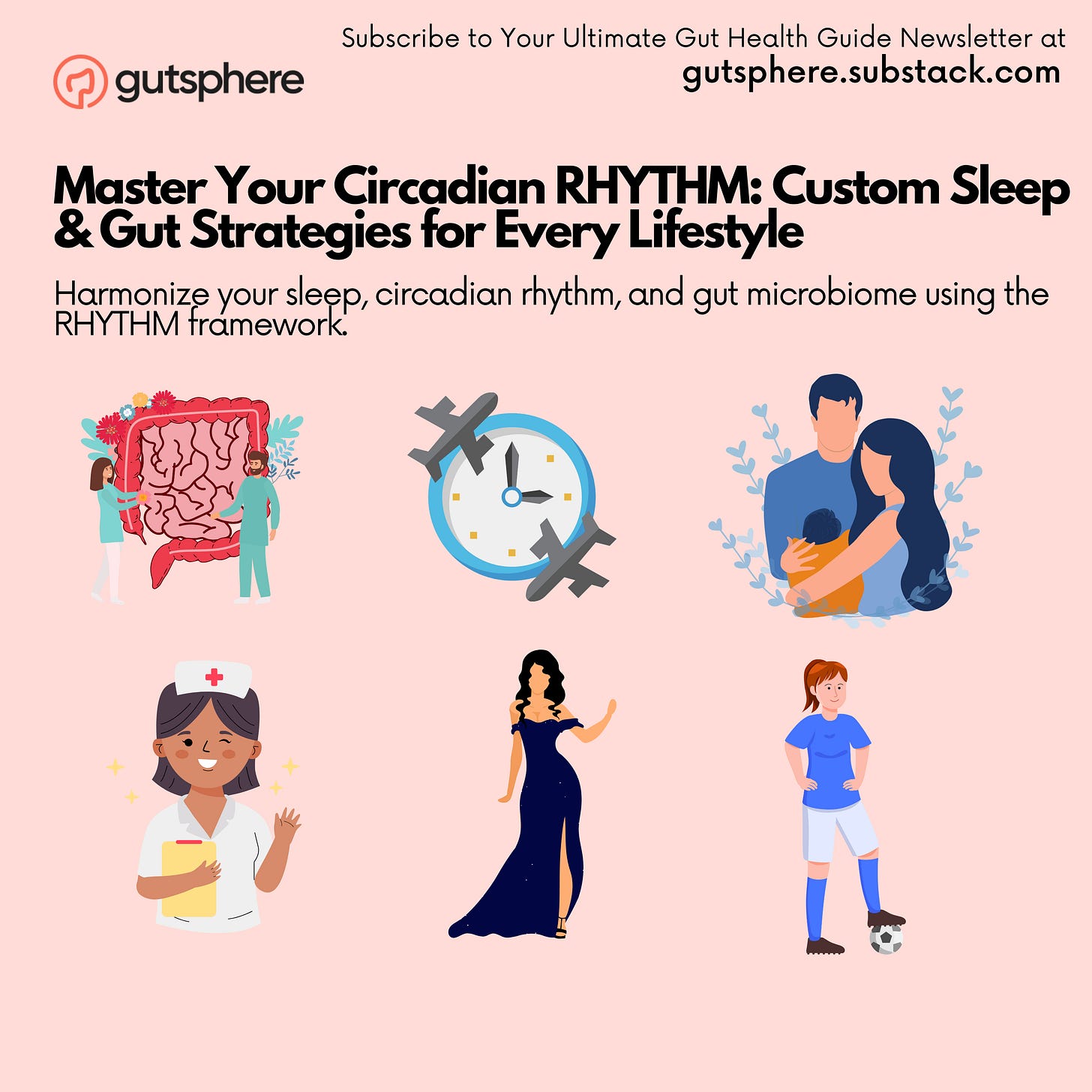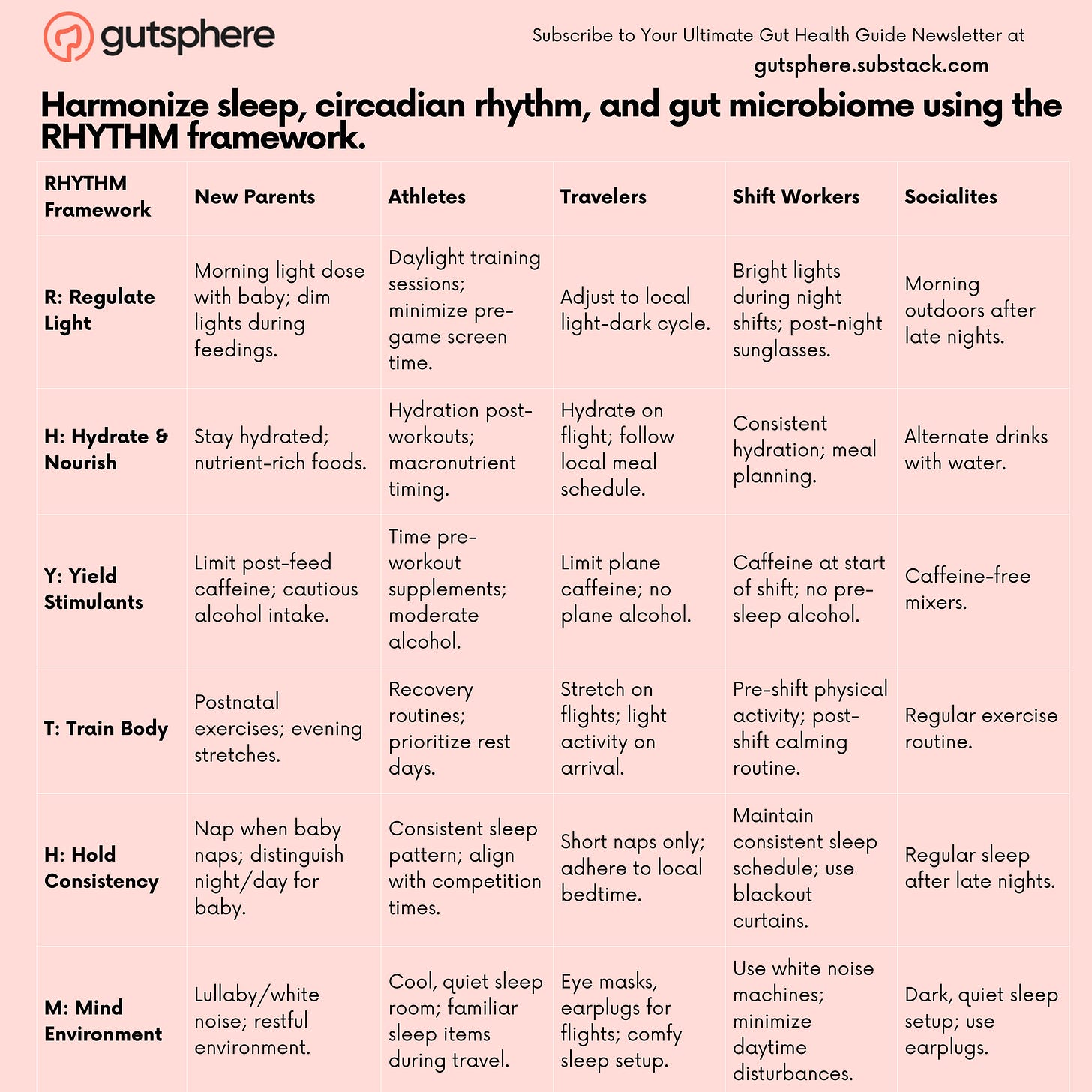Master Your Circadian RHYTHM: Custom Sleep & Gut Strategies for Every Lifestyle
Harmonize sleep, circadian rhythm, and gut microbiome using the RHYTHM framework.
Welcome Back Gut Sphere Friends,
In the previous edition, we talked about strategies. We figured we will introduce a framework that will help us easier to remember those strategies.
so, let’s introduce the RHYTHM Framework to help us harmonize our circadian rhythm, sleep, and gut health and minimize the disruptions due to our lifestyle, choice of work, and life.
The RHYTHM Framework
R - Regulate Light: Our body's internal clock, or circadian rhythm, is heavily influenced by light.
Morning: Seek out natural light. Aim for at least 20 minutes outside.
Evening: Dim lights and consider blue-light blocking glasses after sundown.
H - Hydrate & Nourish: What we eat and drink matters.
Stay hydrated throughout the day, especially when traveling.
Keep a consistent eating schedule. Avoid large meals close to bedtime.
Y - Yield from Stimulants: Timing for caffeine and alcohol matters.
Limit caffeine consumption to mornings.
Avoid alcohol 3-4 hours before bedtime.
T - Train our Body: Physical activity can influence our sleep and circadian rhythm.
Morning or afternoon is often the best time for rigorous exercise.
Consider light stretching or relaxation exercises in the evening.
H - Hold Consistency: Try to sleep and wake at the same times every day, even on weekends.
Even if we stray from our schedule, return to it as soon as possible.
M - Mind our Environment: The environment plays a role in sleep quality.
Keep the bedroom cool, dark, and quiet.
Consider tools like white noise machines or blackout curtains.
Now, Let's customize the RHYTHM framework for each group.
New Parents:
R - Regulate Light:
Morning: Even with sleep interruptions, try to get a dose of morning light with the little one.
Evening: While late-night feedings are inevitable, keep lighting dim to help signal to both parents and baby's body that it's night.
H - Hydrate & Nourish:
Stay hydrated especially if breastfeeding.
Opt for nutrient-rich foods to support postnatal recovery and energy demands.
Y - Yield from Stimulants:
Limit caffeine, especially if breastfeeding. If needed, have it right after feeding to reduce its concentration by the next feeding time.
If consuming alcohol, follow recommended guidelines for breastfeeding mothers.
T - Train Your Body:
Engage in postnatal exercises, even short walks can make a difference.
Gentle evening stretches can alleviate body aches from carrying or nursing.
H - Hold Consistency:
While hard, try to nap when the baby naps to catch up on sleep.
Encourage baby to recognize night and day to help them establish a circadian rhythm.
M - Mind Your Environment:
Create a restful environment for both baby and you.
Consider soft lullaby music or white noise machines to soothe baby (and parents) to sleep.
Athletes:
R - Regulate Light:
If training outdoors, try to schedule sessions during daylight hours.
Evening wind-downs are crucial, especially before game days. Minimize screen time.
H - Hydrate & Nourish:
Athletic hydration needs are high. Replenish fluids after workouts.
Consume a balanced diet, paying attention to macronutrient timing related to workouts.
Y - Yield from Stimulants:
Pre-workout supplements often contain caffeine. Time these well to avoid sleep disruptions.
Alcohol can impair muscle recovery. Consume in moderation.
T - Train Your Body:
Incorporate recovery routines like stretches or foam rolling in the evening.
Rest days are as important as training days.
H - Hold Consistency:
Regular sleep patterns optimize recovery and performance.
Try to align sleep schedules with competition times.
M - Mind Your Environment:
Sleep in a cool, dark, quiet room to promote deep sleep and muscle recovery.
Traveling for competitions? Bring familiar sleep accessories to help adjust to new environments.
Travelers:
R - Regulate Light:
Fight jet lag by adjusting to the local time zone’s light-dark cycle as soon as possible.
Use light therapy if crossing several time zones.
H - Hydrate & Nourish:
Plane travel can be dehydrating. Drink water before, during, and after flights.
Eat according to the local meal schedule to adjust quicker.
Y - Yield from Stimulants:
Limit caffeine during long-haul flights.
Avoid alcohol on planes; it can amplify dehydration.
T - Train Your Body:
Stretch or walk during long flights.
Engage in light physical activity upon arrival to reset our body clock.
H - Hold Consistency:
As tempting as it might be, try not to nap for too long upon arrival.
Stick to local bedtime to adjust faster.
M - Mind Our Environment:
Use earplugs and eye masks on flights.
In a new place, ensure the sleep environment is comfortable. Consider travel-friendly sleep aids like portable humidifiers.
Shift Workers:
R - Regulate Light:
Use bright lights at work during night shifts.
Wear sunglasses when coming out of a night shift to signal to our body that it's bedtime.
H - Hydrate & Nourish:
Plan meals to avoid heavy foods during the inactive parts of your cycle.
Stay hydrated, especially if our shift involves physical labor.
Y - Yield from Stimulants:
If needed, consume caffeine at the start of the shift but avoid it in the hours leading to sleep time.
Avoid alcohol as it can further disrupt the sleep-wake cycle.
T - Train Your Body:
Engage in physical activity before your shift to increase alertness.
Post-shift, calming activities can help in winding down.
H - Hold Consistency:
Try to maintain a consistent sleep schedule, even on days off.
Darken your room during the day using blackout curtains or sleep masks.
M - Mind Your Environment:
Make your sleep environment conducive. Consider white noise machines if daytime noises disrupt sleep.
Inform family and friends of our sleep timings to minimize disturbances.
Socialites:
R - Regulate Light:
Even if you party till late, spend the next morning outdoors to get natural light.
If you're indoors, choose well-lit venues.
H - Hydrate & Nourish:
Alternate alcoholic drinks with water when out.
Eat a balanced meal before heading out to reduce the effects of alcohol.
Y - Yield from Stimulants:
Be mindful of mixers in cocktails, as some might have caffeine.
If partying late, avoid caffeine close to bedtime.
T - Train Your Body:
A dance at the club is great, but also incorporate regular exercise into your routine.
After late nights, engage in relaxing activities the next evening to wind down.
H - Hold Consistency:
Try to get back to our regular sleep schedule after late nights out.
If you've been up very late, avoid long daytime naps. Instead, opt for short power naps.
M - Mind Your Environment:
After a night out, make sure your sleep environment is quiet and dark to maximize sleep quality.
Use earplugs if needed to drown out early morning noises.
In Conclusion: The RHYTHM Framework
The synchronization of our body's internal clock, gut health, and sleep forms the cornerstone of holistic wellness. As our lives continually evolve with unique challenges – from adapting to different time zones to the sleep-deprived nights of new parents – the RHYTHM framework offers a tailored approach to maintain a sense of equilibrium. By adhering to these strategies, not only do we optimize our daily functioning, but we also set a strong foundation for long-term health and vitality.
But as we glimpse into the horizon, what does the future hold for sleep and gut health research? How will emerging technologies and scientific breakthroughs redefine our understanding of these intertwined realms?
Next: The future of Sleep and Gut Health Research
Stay tuned as we embark on an exciting exploration into the future of Sleep and Gut Health Research in our next segment. The discoveries might just surprise us!
Request
Share
Our sincere request to you is to share the newsletter with your friends, family, and community so that they can benefit from the content. Also it will help us grow the newsletter, and eventually, as we release more content, digital tools, and more we will enable people around the world to live chronic disease free.
Subscribe
Feedback
Also, please give us feedback so that we can improve the content. And if there are any topics that you want us to cover please send us your questions and topics. Furthermore, if you try any of the things we provided information please share your experience with us.
Thank You
GutSphere Team
Disclaimer
Please note that the information provided in this newsletter is for informational purposes only and should not be considered as a substitute for professional medical advice, diagnosis, or treatment. If you have any concerns or questions about our health, please consult with a licensed healthcare professional. The information contained in this newsletter is not intended to diagnose, treat, cure, or prevent any disease. The publisher and authors of this newsletter assume no responsibility for any adverse effects that may result from the use of the information contained herein.



